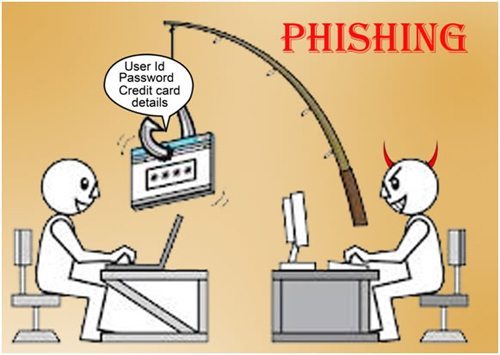
Cyber criminals are using different mode of attacks to get your personal data, Phishing Scams are one of them.
What is Phishing?
Phishing Scams are typically fraudulent email messages appearing to come from legitimate enterprises. These messages usually direct you to a spoofed website or otherwise get you to divulge private information. The perpetrators then use this private information to commit identity theft.Phishing Scams are usually done through email messages, websites, and phone calls are designed to steal money. Cyber criminals can do this by installing malicious software on your computer or stealing personal information off of your computer.
How To Find Phishing Email?
Spelling and bad grammar
Cyber criminals are not known for their grammar and spelling. Professional companies or organizations usually have a staff of copy editors that will not allow a mass email like this to go out to its users. If you notice mistakes in an email, it might be a scam.
Beware of links in email
If you see a link in a suspicious email message, don’t click on it. Rest your mouse on the link to see if the address matches the link that was typed in the message. The string of cryptic numbers looks nothing like the company’s web address. Links might also lead you to download some files. These kinds of file are known to spread malicious software.
Threats
Have you ever received a threat that your account would be closed if you didn’t respond to an email message? The email message shown above is an example of the same trick. Cyber criminals often use threats that your security has been compromised.
Spoofing popular websites or companies
Scam artists use graphics in email that appear to be connected to legitimate websites but actually take you to phony scam sites or legitimate-looking pop-up windows. Cyber criminals also use web addresses that resemble the names of well-known companies but are slightly altered.
Beware Of Phishing Phone Calls Too
Cyber criminals might call you on the phone and offer to help solve your computer problems or sell you a software license. So don’t fall in these types of unsolicited phone calls to charge you for computer security or software fixes. Once they’ve gained your trust, cyber criminals might ask for your user name and password or ask you to go to a website to install software that will let them access your computer to fix it. Once you do this, your computer and your personal information is vulnerable.Treat all unsolicited phone calls with skepticism. Do not provide any personal information.
Where To Report Phishing Scams
- You can report a phishing scam attempt to the company that is being spoofed.
- You can also send reports to the Federal Trade Commission (FTC).
- Depending on where you live, some local authorities also accept phishing scam reports.
- Finally, you can send details to the Anti-Phishing Working Group, which is building a database of common scams to which people can refer.
Article By – Harshita C. Jadhav
The article focuses on a type of cybercrime, which is, phishing.
He has defined phishing, and also provided the readers with the details of how they may define that a mail is that of phishing or not.
Safety measures against such phone calls, and where can the victim file complaint or which authority he may go to in such a condition is also mentioned in the article.
This is really very nice article and I fell much more informed about phishing know and more than that I now know more ways to deal from it and be safe from such cyber crime.